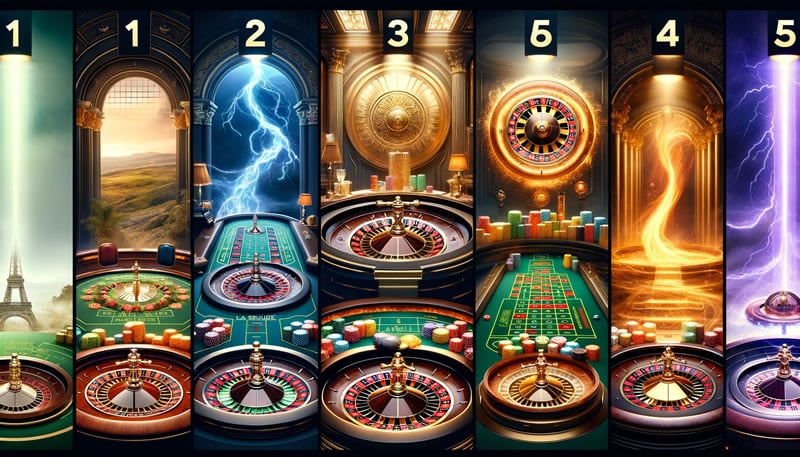The allure of the jackpot is so strong that individuals across different backgrounds are drawn to it. A strong allure that is hard to resist is the possibility of winning a sizable quantity of money through gaming at casinos, participating in lotteries, or playing games of chance. For countless individuals worldwide, the idea of achieving sudden wealth and financially independent overnight holds great appeal. Several psychological factors play a role in the jackpot's allure.
Main Points
- The allure of the jackpot: The thrill of winning big draws people in due to the potential for life-changing rewards.The dopamine-driven jackpot effect: The brain's response to potential gains, such as winning a jackpot, is driven by the release of dopamine, creating a sense of pleasure and motivation.Risk and reward dynamics: The attraction to jackpots is fueled by the combination of risk with the possibility of reward, activating the brain's reward system.Optimism and hope in jackpot pursuits: The possibility of winning big influences our outlook, fostering a sense of hope and optimism for the future.The impact of social and cultural factors: Our attraction to jackpots is shaped by societal values, cultural norms, and peer pressure.
The ability to indulge in luxuries without worrying about money and the possibility of financial liberation are the main draws for many. The allure of potentially affording anything, such as luxurious clothing or far-flung travel, pushes individuals to strive for big successes. Also, a major part of the jackpot's appeal comes from its element of surprise & uncertainty. One cannot easily duplicate the adrenaline rush that is felt when imagining a big win with a single lottery ticket purchase or by spinning the wheel for a large payout. The allure of the jackpot also appeals to people's primal need for adventure and thrill-seeking.
The chance of getting rich offers an exciting new life free from the routine of day-to-day living. Lots of individuals are driven to chase after huge jackpots because they find great resonance in the concept of taking a risk & possibly coming out on top. The thrill of placing a huge bet or the suspense of waiting for the lottery results are just two examples of the many ways in which jackpots attract us because they represent human nature's need for excitement and risk. The Function of Dopamine in Expecting Rewards. Dopamine is critical in our draw to jackpots, which is why jackpots are irresistible.
A neurotransmitter called dopamine is released in response to pleasurable experiences like eating delicious food, engaging in fun activities, and yes, winning big. Dopamine plays a crucial role in the brain's reward system. Dopamine is triggered in our brain in anticipation of a possible reward, such as a lottery win, which makes us feel good and pushes us to seek more rewards. The dopamine-driven pursuit of huge wins. There’s a powerful drive to look for chances for large wins by the strong attraction that is fueled by dopamine production in response to possible rewards.
The possibility of winning the lottery floods the brain with dopamine, which creates a rush of euphoria and joy. This dopamine surge that drives our desire to take chances in the hopes of striking it rich & draws us to jackpots. Addiction and compulsive behavior: the dark side of dopamine. The brain releases dopamine in a cascade when we anticipate a big win, which can cause addiction-like excitement of hope and excitement. Gambling addiction often stems from this, which can be explained by dopamine's role in our draw to jackpots. A powerful psychological force that can result in addiction & a loss of self-control is driven by the dopamine released for big win potential.

Taking chances has been crucial to human survival throughout history because it often determined gathering food and going without. Because our ancestors found this behavior beneficial in obtaining food, shelter, and other necessities, it is ingrained in our brains to seek out high-reward risks. This natural inclination for risk continues to influence us today, causing us to be drawn to jackpots and urging us to take more risks in the hopes of hitting big.
Risk and reward drive our pull to jackpots, which relates to our craving for freedom and autonomy. The potential for wealth offers the chance to live life without limits and on one's own terms. The prospect of taking a chance and perhaps landing huge rewards appeals to our innate need for independence and self-determination, which drives us to chase big rewards in the quest for financial freedom. Our attraction to jackpots is largely driven by the optimism and hope that big wins inspire. The possibility of striking it rich provides a ray of hope for a brighter future, which bolsters our confidence and drives us to go after big wins.
It is hard to ignore the sense of hope that comes from the thought that one fortunate event has the potential to transform our lives. The potential for great wealth taps into our innate yearning for optimism & hope, pushing us to take risks in the quest for future prosperity and financial stability. The psychology of optimism and hope also has a significant impact on how we think in the pursuit of big wins.
We are energized by hope and we are motivated to pursue big wins despite the odds when we have the possibility of winning the jackpot. This sense of hope and excitement can be highly addictive. We gamble for financial freedom because we have an unyielding optimism that one fortunate break could improve our lot in life. The role optimism plays in our mindset when it comes to going for big wins also relates to our innate need to be in charge of our own lives. Our optimism is fueled by the possibility of winning big, which drives us to gamble in the pursuit of financial independence and liberation from money worries. It is impossible to overestimate the influence of social & cultural factors on our attraction to jackpots.
We are continuously exposed to messages that strengthen the allure of striking it rich, with media portrayals of overnight millionaires to societal norms to attain financial success. Our attitudes toward chasing large wins website are shaped by the ubiquitous influence of social and cultural factors, which fuel our jackpot addiction and spur us to take chances in the quest for financial security. Social pressure and cultural expectations are just two more examples of how cultural pressures shape our attraction to jackpots. Chasing big wins is seen as an desirable, glitzy, and thrilling endeavor in many social circles.
People may chase large wins in an effort to gain validation or impress others by feeling pressured to match the success of peers or coworkers who have made money through gambling. The human desire for recognition is further evidenced by the societal influences on our attraction to jackpots. What draws us to jackpots and pushes us to gamble in the hopes of winning big is the chance for wealth and fame, which can boost our status. The Addicting Cycle of Pursuing Huge Wins. Dopamine's influence on big wins can create a dangerous cycle that pushes people to keep gambling in the hopes of winning big, frequently at great personal expense.
Chasing losses can create a detrimental cycle that could seriously impact someone's finances and overall happiness. Jackpots' Dark Side: Mental Health Effects. Pursuing big wins can have detrimental effects on personal relationships and mental health in addition to financial ruin. People who develop an addiction to gambling frequently struggle with ever-growing debts & money problems, which can create anxiety, depression, and hopeless.

In addition, chasing jackpots can strain bonds with friends & family, leaving one feeling alone & loneliness. The necessity of Support & Awareness. The dangers of going after large winnings make it clear that individuals struggling with addiction need compassion and assistance.
Society must recognize the risks of gambling and offers assistance to those in danger of addiction. By taking these steps, we can work towards a setting that is safer and more encouraging for those struggling to resist the temptation of jackpots. Create healthy gambling habits to help people manage the psychological effects of jackpot pursuits.
Limiting the amount of time and amount of money invested on gambling activities can help people stay away from compulsive behavior patterns and lessen the risks involved in chasing large wins. For those who may be battling addictive behaviors due to jackpot chasing, seeking support from friends, family, or trained professionals can be hugely beneficial. Individuals can protect themselves from falling into addiction by learning effective coping mechanisms for handling stress and anxiety.

People can experience the excitement of chasing large wins without giving in to the negative effects of compulsive gambling behavior by understanding the mental triggers behind jackpot attraction & cultivating responsible, healthy gambling habits.
FAQs
Why are we drawn to huge jackpots?
Our interest in large jackpots stems from the brain's reward system. When we think about winning big, our brains produce dopamine, a neurotransmitter linked to joy and reward-seeking. This dopamine release creates a feeling of excitement and anticipation, making it addictive.
What keeps people playing after they lose?
Gamblers keep playing despite losses due to the phenomenon known as "near-miss" experiences. When individuals come close to winning but ultimately fall short, it triggers a surge of dopamine similar to that of an actual win. This near-miss experience fuels hope and drives them to keep playing, despite previous losses.
How does social pressure fuel jackpot attraction?
Social influence plays a significant role in our craving for jackpots. The visibility of jackpot winners in the media and within social circles builds social validation, leading individuals to think winning is possible and worth pursuing. On top of that, the joy and celebration around big wins can influence others to participate in similar activities.
What are the downsides of craving jackpots?
Craving big wins can have negative consequences, particularly when it becomes compulsive or addictive. Excessive gambling in pursuit of big wins can result in financial strain, relationship problems, and mental health issues. Moreover, the allure of winning big jackpots can create false hope and skew one's view of odds.
How can individuals manage their attraction to winning big jackpots in a healthy way?
You can keep jackpot cravings under control with smart strategies by setting limits on their gambling behavior, gambling responsibly, and asking for help if they suspect their interest is turning into an issue. It's important to keep gambling in perspective and enjoy it for fun over the pursuit of large wins.